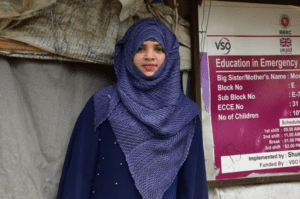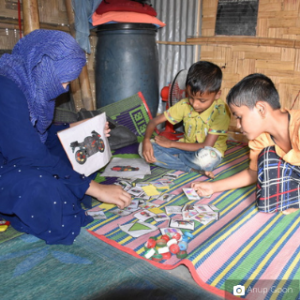Photos: Anup Goon
In the series ‘Our Year in Stories’, we highlight several stories from our 2020/2021 Annual Report. This time, a story about education in one of the world’s largest refugee camps, Cox’s Bazar, in Bangladesh. Big sister Moreom works together with other changemakers to create a better future for Rohingya children.
Millions of children around the world are forced from their homes by conflict and natural disaster. Many of these children do not automatically have the right to state education in the place they find themselves. The trauma they experience by being displaced can have long term effects on their development.
VSO has developed an education in emergencies programme that provides quality early childhood care and education to children aged 3 to 14 living in such circumstances in Kenya, Uganda, Ethiopia, and Bangladesh. We combine volunteers who have teaching expertise with those who have community knowledge to provide support, helping children overcome the stress of their experience and environment. Creating safe spaces for learning and play provides a sense of normality, allowing children to regain their childhood.
 Moreom
Moreom
18-year-old Moreom lives in a shelter made of plastic and bamboo, without running water or electricity. She and her Rohingya community were subject to violent attacks from the army and were forced to leave their home in Myanmar. They found shelter in a refugee camp in Bangladesh, but the camp is overcrowded and at risk of landslides, fires, and cyclones. Life there is difficult and Moreom misses freedoms of her old life in Myanmar, where she hopes to return one day.
Moreom was inspired to educate children in her camp. She was accepted to train as a VSO ‘Big Sister’, joining VSO’s network of volunteer educators and caregivers in the camp.


One of Moreom’s students is four-year-old Monir. His mother, Rashida, was pregnant with him when the army killed her daughter and stole the family’s valuables. Rashida fled with her four other children, leaving behind their farm, cattle, and all other possessions. Monir’s father was separated from them when he fled to Malaysia before Monir was born. They do not know if he is alive.
Despite this, Monir is happy. He loves playing with friends in camp and started going to VSO’s homebased early childhood learning centre aged 2. He learnt to name colours, fruits, and animals, write his name, as well as the Burmese and English alphabets. He now helps Rashida write her own name.
Moreom’s VSO training taught her that affection and support are important for children’s learning. She explains this to Rashida and other parents, encouraging them to support rather than punish children.
When the camp went into COVID-19 lockdown, Moreom and Rashida worried about Monir’s learning. So Moreom continued visiting Monir to help continue his education and provide support. VSO provided materials such as books and colouring pencils so he can learn at home. Monir misses playing outside but Moreom’s regular visits make him happy.
Rashida and Moreom know that education is key to the Rohingya’s next generation if they are to save their community. They hope Monir can continue his education and realise his dream of becoming a teacher.
Education in emergencies work is also rolled out to host communities, meaning that all children benefit from VSO expertise. Working with host communities creates acceptance of displaced people. VSO-trained teachers also identify and work with children with disabilities, referring them for further support where necessary. As migration and displacement increases, VSO will continue to provide education to children, wherever needed.
